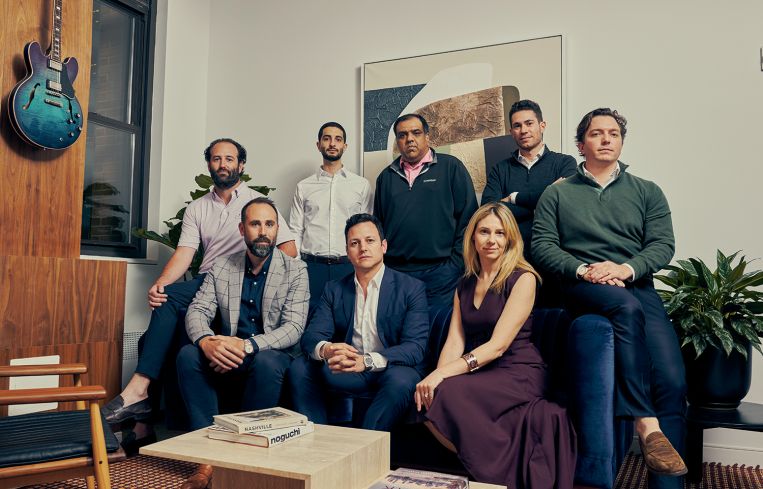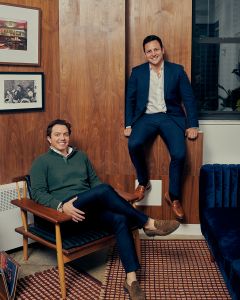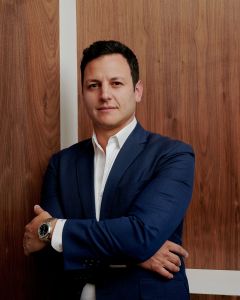Thriving Through a Crisis: SomeraRoad Took The Road Less Traveled
By Cathy Cunningham June 7, 2022 11:00 am
reprints
“It all started with the onset of COVID.”
So said Fergus Campbell, a managing principal at SomeraRoad, explaining how the firm leveled up its business in just the last two years, and giving truth to the old adage that fortune favors the bold.
“A lot of people took a step back with all the uncertainty that arose and what it meant for real estate markets — and everything else in our lives,” said Campbell. “But we took that opportunity to put our heads down, evaluate everything we were doing, and expand our business.”
“And, we’re only getting started,” said Ian Ross, the company’s founder.
Numbers talk, and over the past two years alone SomeraRoad has closed $850 million of new transactions and more than $1 billion of new financings; it sold $300 million of stabilized deals; its net-lease business went from zero to $900 million; it built out a pipeline of $1.5 billion in new construction (with $300 million of new developments breaking ground in the past 90 days alone); and it hired 26 new employees.
Today, its 43 professionals are spread across seven offices. Nashville and New York are the firm’s two joint headquarters, with outposts in Austin, Kansas City, Pittsburgh, Indianapolis and Cleveland. The firm invests across asset types and geographies.
What’s been key to SomeraRoad’s success and growth in this crisis is its laser focus on hiring the best human capital out there, Ross said. During the global financial crisis “we were just buying bonds —which is easier, and needs less people.” During the COVID-19 crisis, by comparison, SomeraRoad launched a distressed debt business, a net-lease business and a development business, and also formalized its investment niche focusing on micro-neighborhoods.
‘We’d seen this story before’
In the pandemic’s earliest — and darkest — days, Ross, sitting behind his Bloomberg terminal, saw a familiar scene beginning to play out in the bond market. “I realized we’d seen this story before,” he said.
Ross had traded CMBS bonds his whole career, starting as an analyst in Morgan Stanley’s securitized products group in 2007 before moving to Jefferies & Company then Triangle Capital Group, where he focused on the acquisition of nonperforming loans and REO (real estate-owned) assets out of CMBS trusts through the global financial crisis. With new panic now rife in the market amid the uncertainty caused by the pandemic, he knew it was time to strike while the iron was hot.
As the leader of a 17-person company at the time, going back to a trading floor wasn’t an option for Ross personally. “I knew we had to hire the best in the business, and build a new team around a debt practice,” he said.
Enter Amit Patel, who Ross had known since his Morgan Stanley days. The world was inarguably on fire when Ross asked Patel to leave his spot at Bayview Asset Management and help launch SomeraRoad’s debt business in April 2020 — but there was also no time to waste. “We moved really quickly,” Ross said.
Patel moved over as SomeraRoad’s director of debt strategies and, for the next 60 days, the firm went “gangbusters,” buying up CMBS. “We did some B-note transactions, bought some mezz, and we put about $100 million out buying distressed credit,” Ross said.
The firm strategically bought debt positions while others were busy selling them off —often due to liquidity issues. “We were happy to step in and provide capital by buying those positions — at the right price,” Patel said. “It allowed us to come in and say, ‘We understand this real estate, and we’ll happily buy this risk at X price and get equity-like returns.’ It was an amazing market opportunity, so we took down a bunch of positions during that time.”
Patel had watched SomeraRoad’s growth trajectory over the years, and was at a pivotal point in his own career at the time of his move. He’d worked on the lending side of the industry and now saw an “unbelievable opportunity” to switch over to the principal side of the business. “It’s something I’ve always wanted to do, and was a way for me to execute on the 15 years of knowledge, experience and relationships I have, all in one place,” he said.
The market dislocation also provided a new opportunity to buy distressed assets, so SomeraRoad snapped up a building in Kansas City, another in Louisville, Ky., and the office that sits above Harry’s restaurant, a Wall Street staple, at 1 Hanover Square in Manhattan — which will soon be SomeraRoad’s New York headquarters.
The firm found market opportunities early on where others didn’t, but “this isn’t hard,” Ross said. “Heart surgery is hard, but we’re not doing heart surgery. This is real estate, and we can figure out anything we need to. The caveat to that is if you bring on really strong resources you can figure it out faster and better.”
Strong resources, yes. But also a smart, data-driven approach.
“We’re like scientists,” Ross said. “We obsess over the data — the who, what, where, when, why and understanding how people or companies in our various markets live, work, play, stay, and why they do so in any given space, what they pay and why. We’re both quant- and qual-heavy.”
You’re no fund
While SomeraRoad has plenty of investors backing it (roughly 50 and predominately multibillion-dollar family offices, insurance companies, hedge funds and wealthy individuals), when SomeraRoad makes a decision to pursue an opportunity, it’s not handcuffed by the constraints of being tied to fund, singular strategy or thesis — unlike many of its competitors.
“We’re not interested in being a fund. We’re interested in being deal focused,” Ross said. “We’re not looking to be hamstrung by the mandates of ‘You have to invest in this, and you have to deploy capital in X amount of time.’ ”
Campbell said that, while the team has different views, skill sets and backgrounds, “We all push and ask the question ‘Why?’ Funds are tied to a specific mandate. They don’t always need to ask ‘Why?’ because they’re trying to fit an opportunity into their fund. For us, we can pursue a different strategy or a different approach if it makes more economic sense or if it produces a better deal or better product. It allows us to be nimble and evolve as we see opportunities.”

While a debt-focused business was a new vertical for the firm, making strategic plays within the CMBS universe was something it was very familiar with. By 2017, shortly after its founding, SomeraRoad had amassed control of around $6 billion of legacy CMBS and REO assets. Many of the loans were hitting their maturity wall and ended up in special servicing, allowing the firm to then either work out or acquire some of the distressed loans and assets.
The experience allowed the young firm to quickly scale its business via new exposure to 72 markets — from Modesto, Calif., to Las Vegas, to Tucson, Ariz., to Portland, Maine, to Jacksonville, Fla., and everywhere in between. “It allowed us to plant flags in these markets, learn about all of them, identify the places that we really wanted to focus on, and establish relationships there,” Ross said.
One market of particular interest was Nashville, which the firm was already invested in pre-pandemic before firmly pressing the accelerator button in 2020.
SomeraRoad owned a 5-acre site in the city — the former Grooms Engine warehouse at 1414 4th Avenue South — with initial plans to convert the single-story building that occupied it into an office property. But with Nashville booming, the firm realized the site’s highest and best use was actually now an apartment complex.
As the firm pondered its portfolio more broadly — which included several qualified opportunity zone (QOZ) sites — lightbulbs of commonality began to appear. “We had a site in Pittsburgh that was adjacent to our Southside Works project we were thinking about selling to a multifamily developer, a deal in D.C. on a QOZ where we could build apartments, plus another site in Nashville, where we could build a vertical tower,” Ross said.
SomeraRoad had been searching for a joint venture partner to help it figure out how to build that Nashville tower, when one day the team decided, “Why don’t we just figure out how to do this ourselves?” Ross said.
As such, a development business became the latest feather in the firm’s cap when it hired Andrew Donchez in June 2020 from Mill Creek Residential Trust, moving him to Nashville to launch the business that August. Previously, Donchez had helped start RXR’s development practice.
“We basically said to Andrew, ‘We have four deals, and you can start tomorrow,’ ” Ross said.
Fast forward to today, and Donchez has built a 12-person team in Nashville, with $1.5 billion of new construction in his pipeline, including The Paseo, South Gulch — a $1 billion megaproject and the jewel in the firm’s Nashville crown. Located minutes from Music City Center and Amazon’s new Nashville Yards, the mixed-use project is anchored by two residential towers, and includes office and retail space.
“In typical Ian style, the development business started as a kernel of an idea,” Donchez said. “He saw an opportunity, and we’ve taken what was initially a handful of one-off projects and built a pretty large development platform around it.”
Since Donchez joined, the firm has added several others to his development team, from companies including Vornado Realty Trust, Toll Brothers City Living and Nashville-based Southern Land Company.
New York-based Jonathon Reeser, co-head of acquisitions, and his family had moved to Nashville in the summer of 2019 as SomeraRoad’s investment activity continued to ramp up there. With Donchez now on board leading its development business, the Nashville headquarters was off to the races. Reeser heads the Nashville office today, overseeing all investment activity there but also in other markets, including Pittsburgh and Las Vegas.
“I’d say we had a head start on groups that are entering Nashville now,” Reeser said of SomeraRoad’s competitive edge in the white-hot market. “We entered the market in 2017 with our first acquisition, and since we’ve been here we’ve created strong relationships with the largest stakeholders in the city. I think we have a competitive advantage just because we’ve shown that we do what we say we’re going to do.”
With top-tier employers such as AllianceBernstein, Amazon and Oracle making big moves in the city, Nashville’s growth— and— draw, is plain to see.
“I think Nashville is probably one of the strongest markets coming out of the pandemic,” Reeser said. “We went in [hard], but we’re very focused on maintaining our ethos as we scale. I think our leadership team is incredibly strong, and we’re all focused on instilling that ethos and culture throughout our company.”

Feds up
Reflecting back on the pandemic, “I didn’t think that the [Federal Reserve] would come in as quickly as they did,” Ross said. But, as it turns out, the Fed’s intervention sparked the launch of another successful vertical at the firm.
“The Fed comes in, rates go to nothing, and we start getting a lot of calls from our investors saying: ‘Fixed-income is dead, we can’t buy corporate bonds, yields are zero, and it’s a really scary place to invest,’ ” Ross said.
A hedge fund manager who had invested with SomeraRoad for years was one of the anxious callers. He was searching for yield for his parents as well as his own balance sheet.
At the same time, SomeraRoad was mulling some of the industrial assets it was selling into the voracious market environment. Over the years, it had acquired industrial deals in a distressed state, stabilized and improved the assets, and then made them the perfect homes for the tenants so they’d no reason to leave. In one example, GE signed a new 15-year lease with one year left on its current lease at a property following the firm’s upgrades.
The hedge fund manager asked: “Instead of selling those assets, would you consider moving them into a new vehicle and establishing a yieldco?”
“We thought it was a good idea,” Ross said.
In December 2020, SomeraRoad started working with Newmark’s Jordan Roeschlaub, Dustin Stolly and Nick Scribani to build out a net-lease vertical. It aggregated $125 million of industrial single-tenant, net-leased assets with creditworthy, mission-critical tenants and long-term leases — some which it owned and had stabilized, some which it bought off market.
By January 2021, the firm announced its income-producing, net-lease vehicle to its network of investors. It went out to the group for $50 million to capitalize the $125 million in product, and within a week had $200 million of interest from those investors.
“Fergus and I looked at each other and said, ‘OK. Sounds like people like this. We can either disappoint our investors by only calling a quarter of their capital, buy the $125 million and move on with our lives. Alternatively, we can figure out how to deploy the $200 million and build a new vertical,’ ” Ross said.
They decided to build a new business around net-lease investments and grow it from there. Fifteen months later, SomeraRoad is at $900 million in assets.
“We’ve built one of the fastest-growing single-tenant industrial net-leased vehicles in the country, period,” Ross said.
To lead its growth, SomeraRoad hired Brian Mansouri, who had been in the net-lease business for 12 years and was running AR Global Investments’ net-lease business, in February 2021.
“We have the tools and the approach to identify opportunities and unlock value in the market that others might not see, whether it’s upfront at acquisition, or through enhancing leases or providing expansion capabilities for our existing tenants post-acquisition,” Mansouri said of the firm’s success.
Patel and Mansouri’s verticals collided happily in February 2022 when SomeraRoad closed its first CMBS single-asset, single-borrower [SASB] transaction, a $525 million refinancing of a 50-property industrial portfolio consisting of single-tenant assets net leased to 35 companies, led by Bank of Montreal. The portfolio spans 6.8 million square feet across 27 states, with an average weighted lease term of 13 years.
“It’s a huge milestone for a company like us, as there aren’t many companies that are able to tap that [SASB] market,” Patel said. “I think it speaks volumes to who we are, the way we carry ourselves, the institutional knowledge that we have, the strength of our collateral, and the strength of our business plan. We did this deal while others weren’t able to do it. A handful of deals were pulled at the end of the year last year, but we were still able to get ours done.”
Micro-hoods
The final tool sharpened in SomeraRoad’s arsenal during the pandemic was its micro-neighborhoods vertical, something that firms like Jamestown have also been successful with — although they’re the exception rather than the rule.
“It’s not something that a lot of firms do,” Ross said. “It’s really hard, but we have five of those projects now.”
The Paseo megaproject in Nashville was the first. “It had to be synergistic, creative and not cannibalize anything,” Ross said.
In Pittsburgh, SomeraRoad is the firm behind Southside Works — an 8-acre, 500,000-square-foot, mixed-use redevelopment that includes office, retail and multifamily, with tenants such as Amazon and Cheesecake Factory. Then, in Indianapolis, it owns The Stutz, a former auto factory that it’s currently redeveloping into a mixed-use project with retail, dining, lifestyle amenities and coworking space.
The most “audacious” micro-neighborhood project, in Ross’ eyes, however, is its West Bottoms project in Kansas City, Mo. SomeraRoad acquired 30 different buildings spanning 20 acres — essentially a quarter of the West Bottoms neighborhood. It’s now undertaking a multiphase adaptive reuse development that will eventually redefine the historic district, once the center of Kansas City’s livestock trade in the 1800s.
Basel Bataineh, co-head of acquisitions, heads the Kansas City office and describes the micro-neighborhoods niche as a “natural evolution” in SomeraRoad’s portfolio, but agrees that the projects aren’t for the faint-hearted.
“It’s one thing to assemble a lot of property and acquire it,” he said. “It’s a whole different thing to conceptualize its redevelopment, and take it through the process of design and entitlements and capitalization and construction and lease-up.”
Not long before Commercial Observer went to print, the firm made its latest talent acquisition, Jessica Cass. She is SomeraRoad’s first chief operating officer and joins from Jones Road Capital Management.
“Everyone is super passionate and driven,” Cass said of her pull to the firm. “They’re intellectually curious and they’re hard working — and that tone is set from the top. The talent they’ve assembled is exceptional, and that immediately stood out to me. I said to myself, ‘Oh, my gosh, it’s not hard to see why these guys have done so well, and grown so much.’ ”
As Donchez puts it: “We’re a young, entrepreneurial group that has come together to achieve a common goal in commercial real estate. We all really enjoy what we do, we all have diverse backgrounds, but we’re a group of people who all see the world the same way. We like creating things, and creating not just value economically, but also buildings and communities that we can be really proud of.”



